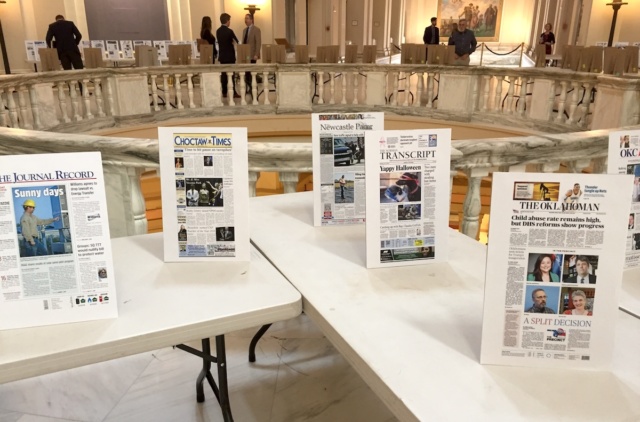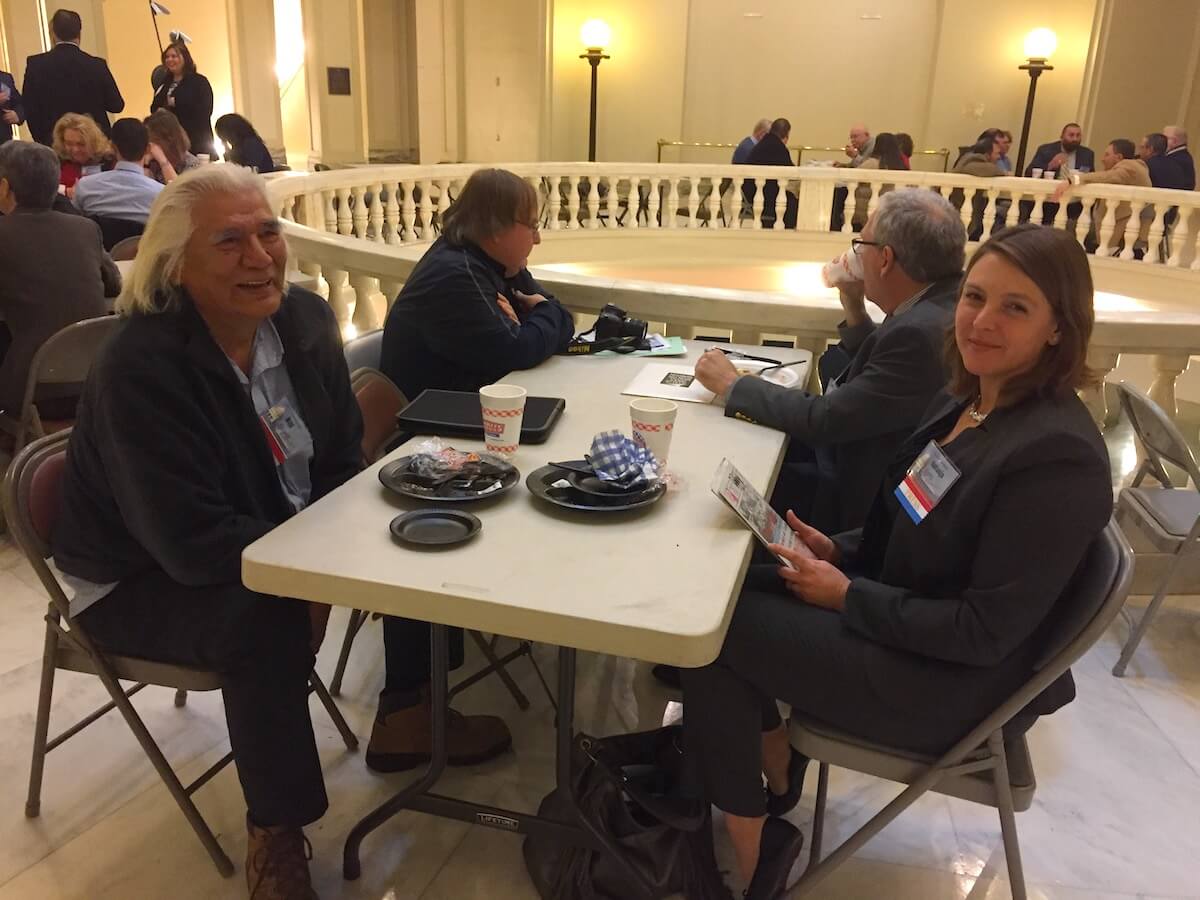
During the first week of Oklahoma’s 2017 legislative session, newspaper editors and publishers descended upon the State Capitol like a scraggly pack of dogs for the Oklahoma Press Association’s annual legislative summit.
I happened to be wandering the Capitol that day, so I decided to sniff a few tails and talk shop with newspaper representatives who are manning the rural front lines of community journalism circa 2017.
“I have no degree. I’m just a high-school graduate,” said Bill Howell, editor of the Pawnee Chief. “Basically everything I know is what I’ve learned in 55 years on the job.”
Howell, 71, has worked for The Chief since 1979.
“Our advertising base is local and covers us staying afloat,” he said.
He and others emphasized the importance of a small publication covering its local school district and local civic groups. He also said adjusting to the digital world has been tough.
“No way,” Howell said when asked if he has a good grasp on the digital age. “I have no idea. As an old guy, I have no idea.”
To that end, the Pawnee Chief does not have its own website, but it does have a Facebook page and sister publications in the towns of Cleveland and Hominy.
“There’s connections. You can use each other’s networks,” said Natasja Kemp, a reporter for the Cleveland American, which does have a website. “We print first, and then we add top stories on the website. Not everything that is in our paper is put on our website.”

The Great Eyeball Race
Kemp and Howell’s web-publishing experiences lie in stark contrast to those of an online-only publication like NonDoc, and I was reminded of a simpler time when Josh McBee and I used to craft the A-section of The Norman Transcript together during the George W. Bush administration.
A full advertising department plugged away at the Revenue Issue in an adjoining room, and Facebook had yet to build its competitive advantage in the great Eyeball Race.
“We kind of always should have been thinking of ourselves as communications companies,” said Mark Thomas, executive vice president of the Oklahoma Press Association. “Printed newspapers is one way we deliver. Digital replicas is another way we deliver. The question in the modern era is always, ‘Can you attract enough eyeballs to bring in enough revenue since a lot of advertising purchased is programmatic, where a computer basically buys wherever it thinks the eyeballs are?’”
I spoke to Thomas on Monday, a few days after the OPA ushered dozens of editors and publishers through the halls of the Capitol. His words about computers choosing to spend digital ad dollars through, say, Google and Facebook instead of local small businesses sent chills up my spine.
Thomas spoke of how small publications have to maximize their specific market.
“I think they are niche publications,” he said. “Their niche is everything that happens with this small-town school district, city council, water district, Lion’s Clubs, Rotary Clubs. So as long as they take care of that, they’ll take care of them. That’s the way it’s always been. There’s more options in larger markets, but that’s the way it’s always been, too.”
Anthony Nieto, general manager of the Okmulgee Times, said that’s what his publication tries to do.
“Okmulgee is a thriving community,” Nieto said. “I believe the community is coming together to make it a better place, and with that we are the voice for the community.”
Nieto said he has one editor and one reporter on staff currently, and that finding qualified journalists to work at smaller papers can be hard.
“I’m looking for a reporter right now,” he said. “We just ran into that problem of finding that position.”
Shauna Belyeu is the general manager of the Eufaula Indian Journal, and she said her paper faces the same difficulty.
“They often have to relocate,” she said of journalists she hires.
Kemp, on the other hand, is from the Cleveland area, something she said can be good and bad when writing about controversial topics.
“People get mad at the newspaper all the time,” she said. “It is harder in a small town because you know people personally. You went to school with them.”
Howell agreed.
“I think we try to be sensitive to the issues put in front of us, whether it’s an earthquake or a fire or whatever,” he said.
When Pawnee hit the national news owing to a record-tying earthquake in September, Howell said he and his staff just tried to avoid being on TV.
Kemp said covering Oklahoma’s rise in earthquakes can be tricky because so many people work in the oil and gas industry, which has been linked to increased seismic activity via wastewater disposal wells.

OPA monitoring potential tax on advertising
While Oklahoma’s smaller newspapers plug along in a changing media environment, Thomas’ job largely exists to ensure that lawmakers recognize the business realities and ethical implications of journalism organizations.
As a result, he said he is tracking 288 bills to start the 2017 session.
“There’s always about three things (we pay attention to),” Thomas said. “Any transparency issues where the public needs access to records that the government keeps about its citizens. Any business issues that might affect newspapers’ ability to do their job — which would be similar to all other businesses. If they tax certain services. We buy all kinds of services.
“And then anything that basically would be a First Amendment issue, which is different than a transparency issue in our mind.”
With Oklahoma leaders proposing a broadening of the state’s sales tax to raise revenue, Thomas will be watching for attempts to repeal the state sales tax exemption on advertising.
“Advertising does two things. It stimulates economic growth. It causes people to buy things, which stimulates all other forms of sales tax,” Thomas said. “Secondly, it’s already sort of built into the cost of the product. In other words, that’s factored in when the business sells something.”
He said the state of Florida taxed advertising buys in the late 1980s, which was repealed less than a year after taking effect.
So far, an advertising sales tax has not been proposed specifically, but Fallin has proposed a sales tax on “radio, TV and publisher representatives.” Such a tax would be estimated to raise about $200,000 for the state, cities and counties.
“We’re assessing where the figure came from and what would be the practical impact of that,” Thomas said. “We’re studying it. Do you just jump up and yell ‘no’ all the time? No.”





















